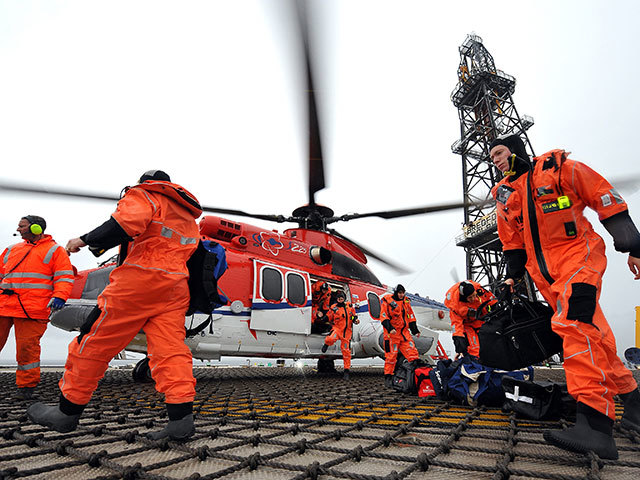
OIL companies may have to charter boats or hire bigger helicopters to accommodate overweight workers following a landmark European legal move.
Legal experts have warned that an attempt to have obese people officially classed as disabled could have “widespread and expensive” consequences for businesses.
The move would offer crucial protection to offshore workers who fall foul of new helicopter safety legislation limiting the size of people travelling to North Sea platforms.
Last night, industry body Oil and Gas UK said it was watching the case closely for the implications it could have for the sector.
Advocate General Niilo Jaaskinen – the European Union’s most senior legal adviser – has ruled that being overweight qualifies as a disability following the sacking of Karsten Kaltoft, a 25-stone childminder from Denmark.
His opinion needs the final backing of the European Court, but if ratified it could lead to radical changes in the way bosses deal with staff.
Employers would have to find ways of accommodating overweight workers so they were not at a disadvantage to their slimmer colleagues.
“It is easy to see that, with obesity on the increase, the cost to the state and private enterprise of ‘fat rights’ may be too much for the UK Government to bear,” said Neil Fraser, employment law partner at Aberdein Considine.
The court’s final ruling will be binding across the European Union, including the UK.
It follows a similar employment tribunal case in England last year where a judge decided a 21-stone man did qualify as disabled.
Mr Fraser added: “The implications of the English decision have still not been fully felt, and a similar decision by the European Court may bring these issues into sharper focus.
“The Equality Act 2010 goes beyond the workplace – it gives protection to disabled people in many areas, including education and transport.
“Clearly the consequences of formal legal rights and protections for the obese could be widespread and expensive.”
The Civil Aviation Authority (CAA) previously announced that oil workers who could not fit through a helicopter’s emergency window while in a survival suit would not be allowed to fly as of April next year.
But the regulator insisted that options were being explored to avoid any negative impact.
Oil and Gas UK’s employment and skills issues manager, Alix Thom, said : “We are aware of the view of the Advocate General and await the decision of the Court of Justice of the European Union. Once this is known, our members will consider what the wider implications will be for industry.”
Les Linklater, team leader for Step Change in Safety, said they too were preparing for the ruling.
“We are aware of the view of the advocate-general and will wait for the decision from the Court of Justice of the European Union with interest,” he said.
“The Step Change in Safety Passenger Size workgroup will ensure all CAA recommendations regarding passenger size are met in the safest way, and with as little negative impact as possible.
“Our industry working group will thoughtfully consider each and every recommendation with the potential to improve the safety and lives of our workforce.”
Finnish lawyer Mr Jaaskinen was appointed advocate-general of the European Court of Justice in 2009.
Recommended for you

